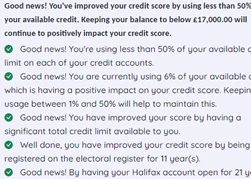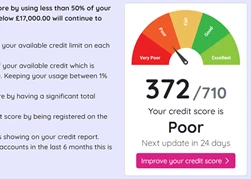Understanding Your Rights When Dealing With Debt Collectors

16th Oct 2025
Dealing with debt collectors can be intimidating. Unexpected calls or letters can cause anxiety, especially if you’re unsure about what they’re legally allowed to do. But the good news is that you have strong consumer rights - and understanding them can protect you both financially and emotionally.
This guide explains your rights when dealing with debt collectors, how to respond correctly, and how to protect your credit score using trusted tools like a credit check online and a free credit score checker.
What Is a Debt Collector?
A debt collector is either a company hired by your original lender or an agency that has purchased your debt at a discounted rate. Their goal is to recover money owed, but they must follow strict rules set by the Financial Conduct Authority (FCA) in the UK.
Debt collectors include those working for:
- · Banks and credit card companies
- · Utility and loan providers
- · Third-party agencies that buy and collect old debts
No matter who contacts you, your rights stay the same. The law ensures all collectors treat you fairly and reasonably. If you ever feel unsure about a debt, it’s wise to check credit online to confirm whether it appears on your credit report.
What Debt Collectors Can Legally Do
Many people assume debt collectors have more power than they actually do. In reality, they are limited by UK law. A collector can:
- · Call or write to request payment
- · Visit your home during reasonable hours
- · Offer payment arrangements
- · Take court action if an agreement isn’t reached
Collectors must identify themselves clearly and communicate respectfully. They cannot demand immediate payment or threaten you.
If you’re unsure whether a debt is legitimate, ask for written proof - and while waiting, perform a credit check online through CreditCheckOnline.co.uk to see if the debt appears on your credit file.
What Debt Collectors Cannot Do?
Understanding what collectors cannot do helps you stay calm and in control. Debt collectors are not allowed to:
- · Harass or repeatedly contact you by phone
- · Use abusive language or intimidation
- · Pretend to be court officials or bailiffs
- · Contact your employer, family, or neighbours about your debt
- · Enter your home without permission or a court warrant
If a collector violates any of these rules, you can report them to the FCA or seek help from Citizens Advice or StepChange. Knowing your rights gives you the power to protect yourself and your credit reputation.
How to Respond When Contacted by a Debt Collector?
When a debt collector reaches out, stay calm. Receiving a letter or call doesn’t mean immediate legal action. Follow these steps to handle the situation correctly:
1. Verify the Debt
Always request written confirmation of the debt. The collector must provide:
- · The creditor’s name
- · The total amount owed
- · Evidence that you’re legally responsible for the debt
Before you pay anything, double-check the details using a credit check online. This ensures the debt actually belongs to you and hasn’t already been settled or misreported.
2. Keep Everything in Writing
Ask the collector to communicate by letter or email so you have a clear record. Written evidence is useful if disputes arise later.
3. Don’t Ignore the Contact
Ignoring calls or letters won’t make the issue disappear. It could lead to court proceedings. Instead, respond professionally and seek advice if needed.
4. Get Professional Help
Free support is available from debt charities such as StepChange or Citizens Advice. They can help you set up affordable payment plans or challenge unfair treatment.
Negotiating a Payment Plan
If the debt is valid and you’re able to pay, try negotiating reasonable repayment terms. Most collectors will agree to smaller monthly instalments rather than forcing full payment at once.
Be honest about what you can afford and never commit to payments that exceed your budget. Creating a realistic plan can help you regain control while protecting your credit rating.
Monitoring your progress through a free credit score checker helps you see improvements over time as you clear your debts responsibly.
Protecting Your Credit Score
Debt collection activity often appears on your credit file, which can affect your ability to borrow in the future. That’s why keeping an eye on your credit health is essential.
Use a credit check online to see if any default or collection entries have been added to your report. If you find mistakes - such as debts that don’t belong to you - you can dispute them with the credit reference agencies.
Regularly using a free credit score checker helps you track improvements and identify changes as you pay off debts or resolve errors. It’s one of the best ways to protect your financial profile from long-term damage.
How to Dispute Incorrect Debts
Sometimes debt collectors pursue the wrong person or the wrong amount. If you believe this has happened:
- 1. Request written proof of the debt.
- 2. Do not make payments until you receive evidence.
- 3. Submit a written dispute to the collector and the original creditor.
- 4. If unresolved, escalate to the Financial Ombudsman Service (FOS).
While the matter is under review, you’re not legally required to pay. A quick credit check online will show whether the disputed debt appears on your file, helping you document your case more effectively.
Managing the Stress of Debt Collection
Debt can take a serious emotional toll, leading to anxiety, loss of sleep, or depression. Remember - you’re not alone, and support is available.
Reach out to trusted charities or speak to a debt counsellor who can guide you confidentially. Taking proactive steps - such as checking your credit with a free credit score checker - can help you feel more in control and reduce stress about the unknown.
Preventing Future Debt Collection Problems
Once your current debts are managed, take steps to avoid similar problems in the future. Here are a few long-term strategies:
- · Budget wisely: Know your income and expenses each month.
- · Build an emergency fund: Save for unexpected costs.
- · Use credit responsibly: Borrow only what you can repay.
- · Monitor your report: Regularly check credit online to spot issues early.
Over time, these habits improve your creditworthiness and reduce the likelihood of facing debt collectors again.
Final Thoughts
Facing debt collectors can feel overwhelming, but knowledge truly is power. When you understand your rights, you can handle any situation with confidence.
Remember that collectors must follow the law and you always have the right to verify, dispute, or negotiate a debt. Keep your financial health strong by regularly performing a credit check online and tracking your progress through a free credit score checker.
By staying informed and proactive with CreditCheckOnline.co.uk, you can protect your credit, reduce stress, and move toward a more stable financial future.
Don't risk missing
something important
Access a comprehensive credit report
that includes detailed data from TransUnion
View your credit score for only £1.95.
You can view it for 1 month, after which it will be £14.95 per month unless cancelled.
See How You Score

See How You Score
An Independent View Of Your Credit Score
Lenders typically use their own systems to calculate your Credit Score based on the information in your Credit Report, often checking with one or more Credit Reference Agencies. Your Credit Check Online Credit Score is derived from all the Credit Report information we gather from TransUnion, helping you understand how you might be assessed when applying for credit.

Understand What is Affecting Your Credit Score
Quickly see how the details in your Credit Report influence your Credit Check Online Credit Score, both positively and negatively. This clear overview helps you identify areas for improvement and better understand the factors that lenders consider when assessing your creditworthiness.
View your credit score for only £1.95.
You can view it for 1 month, after which it will be £14.95 per month unless cancelled.